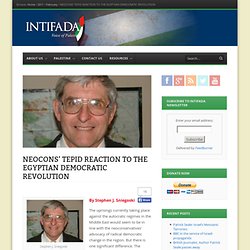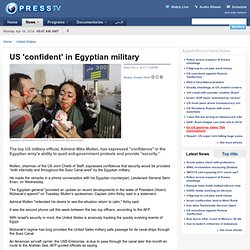

In Mubarak's final hours, defiance surprises U.S. and threatens to unleash chaos. After a week of crossed signals and strained conversations, the Obama administration finally had good news: Late Wednesday, CIA and Pentagon officials learned of the Egyptian military's plan to relieve President Hosni Mubarak of his primary powers immediately and end the unrest that had convulsed the country for more than two weeks.

The scheme would unfold Thursday, with the only uncertainty being Mubarak's fate. "There were two scenarios: He would either leave office, or he would transfer power," said a U.S. government official who was briefed on the plan. "These were not speculative scenarios. There was solid information" and a carefully crafted script. But the Egyptian president decided at the last minute to change the ending. "Mubarak called an audible," the official said. The Egyptian president startled many of his aides with an address, unseen by others, in which he appeared determined to cling to office.
ElBaradei criticizes U.S. approach to Egypt. A new chapter in US foreign policy? - Inside Story. Finally, what Washington cares about in Arab world; maintaining Zionism « Antony Loewenstein. Hillary Clinton: Middle East facing 'perfect storm' 5 February 2011Last updated at 12:57 Hillary Clinton: "There are risks with the transition to democracy" US Secretary of State Hillary Clinton has said the Middle East is facing a "perfect storm" of unrest and nations must embrace democratic change.

Speaking in Munich, Mrs Clinton said the status quo in the region was "simply not sustainable". She said that transition to democracy could be chaotic but in the end "free people govern themselves best". She was speaking following unrest that has seen Tunisia's president flee and Egypt gripped by protests. There have also been major protests in Jordan and Yemen. NEOCONS’ TEPID REACTION TO THE EGYPTIAN DEMOCRATIC REVOLUTION. By Stephen J.

Sniegoski The uprisings currently taking place against the autocratic regimes in the Middle East would seem to be in line with the neoconservatives’ advocacy of radical democratic change in the region. But there is one significant difference. The neocons had sought to use democratic revolutions to overthrow the enemies of Israel, even applying it, much less successfully, to countries such as Saudi Arabia, which were client states of the United States; but now democratic revolution is engulfing the Mubarak regime in Egypt, which maintained friendly relations with Israel. As Israeli writer Aluf Benn points out in Ha’aretz, “[t]he fading power of Egyptian President Hosni Mubarak’s government leaves Israel in a state of strategic distress. The neocons differ among themselves, however, in their assessment of the current situation and in their prescriptions for U.S. actions.
Abrams asserts that George W. Muravchik posits three possible outcomes. Stephen J. US army ready to help Egypt. Égypte: Obama alerté fin 2010, le renseignement mis en cause. Stephanie O'Sullivan répondait jeudi aux questions des élus de la commission du Renseignement du Sénat lors de son audition de confirmation pour le poste de numéro deux du Renseignement américain (DNI).

«Nous avons tiré le signal d'alarme à propos de l'instabilité (...) à la fin de l'année dernière», a-t-elle dit, répondant à une question du sénateur démocrate Ron Wyden, qui lui demandait quand le président Obama avait été prévenu. La présidente démocrate de la commission Dianne Feinstein a émis des doutes sur les capacités du renseignement américain à informer le président, la secrétaire d'État et le Congrès dans des délais adéquats.
«Ces responsables méritent d'être informés à temps», a-t-elle estimé. «J'ai des doutes quant au fait de savoir si la communauté du renseignement a été à la hauteur de ses obligations dans ce domaine», a-t-elle dit en précisant que sa commission allait continuer d'examiner la question. US National Guard troops heading to Egypt. The ‘Italian Job’ and Other Highlights From U.S.’s Rendition Program With Egypt. Abu Zaabal prison, 25 kms north of Cairo, after a mass breakout during the nationwide protest.

(AFP/Getty Images file photo) Among the many aspects of the U.S. -Egypt relationship, few have been as controversial as the CIA’s extraordinary rendition program, where the agency frequently handed over suspected terrorists to foreign governments with histories of torture and illegal detention. According to Human Rights Watch, Egypt welcomed more CIA detainees than any other country from the 1990s through 2005. And while renditions happen only with the assurance that a foreign partner will not torture the prisoner, as one CIA officer once told Congress, the assurances “weren’t worth a bucket of warm spit.” US 'confident' in Egyptian military. US 'confident' in Egyptian military Egyptian protesters scramble to evacuate the wounded.

The top US military official, Admiral Mike Mullen, has expressed "confidence" in the Egyptian army's ability to quell anti-government protests and provide “security.” Mullen, chairman of the US Joint Chiefs of Staff, expressed confidence that security would be provided “both internally and throughout the Suez Canal area" by the Egyptian military. He made the remarks in a phone conversation with his Egyptian counterpart, Lieutenant General Sami Enan, on Wednesday. Washington's dilemna: should you try to get rid of an ally?